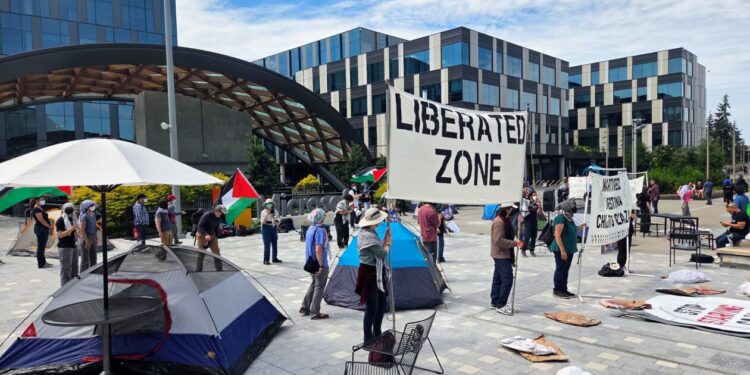Current and former Microsoft employees established a temporary encampment on the company’s Redmond campus Tuesday, escalating efforts to pressure the tech giant over its technology contracts with the Israeli government.
The No Azure for Apartheid group occupied part of Microsoft’s East Campus plaza for more than an hour, creating what they called a “Liberated Zone” with tents, symbolic shrouds representing Gaza casualties, and a negotiations table calling for company executives to engage in dialogue.
The protesters allege that Microsoft’s technology is being used in surveillance and military operations affecting Palestinians in Gaza. Julius Shan, a software engineer who said he has worked at Microsoft for nearly five years, told fellow employees that “Microsoft’s money does include blood money.”
Microsoft has maintained that its contracts with Israel’s Ministry of Defense are standard commercial agreements governed by its terms of service and AI Code of Conduct. The company states it complies with human rights commitments and does not permit its technology to be used for unlawful surveillance or human rights abuses.
Redmond police informed protesters they were trespassing on private property and subject to arrest, prompting the group to relocate to a nearby public sidewalk after taking down the encampment. Microsoft employees observing the demonstration expressed mixed reactions to both the message and tactics.
The protest represents an escalation in the group’s year-long campaign, which has included disrupting company events and staging demonstrations at executives’ homes. Earlier this month, protesters demonstrated outside the residence of Teresa Hutson, corporate vice president of Microsoft’s Trusted Technology Group.
Microsoft announced on August 15 that it is launching a formal review into allegations that its Azure cloud services were used by the Israeli military for mass surveillance of Palestinians. The company hired law firm Covington & Burling to lead the review and pledged to make findings public once complete.
The review follows reports in The Guardian, +972 Magazine, and Local Call citing sources alleging that Israeli Defense Forces stored data from widespread phone monitoring of civilians in Gaza and the West Bank on Microsoft servers. Microsoft has said it was not aware of any civilian surveillance.
The activism occurs amid ongoing humanitarian concerns in Gaza and stalled ceasefire negotiations. Hamas has agreed to a proposed 60-day ceasefire with phased hostage releases, while Israeli officials have demanded the release of all hostages and rejected partial agreements.







